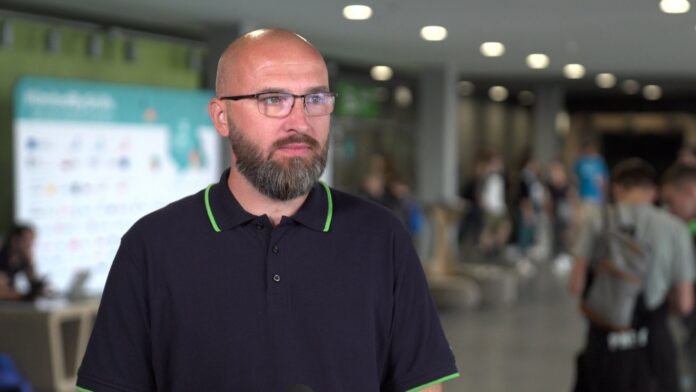After years of neglect and underfunding, vocational education is beginning to enjoy increasing popularity in Poland. According to MEiN, currently 58.5% of young people after primary school choose vocational and technical education. This is good news for companies for which the shortage of qualified staff with the right competencies is one of the main problems. “Our role as business and employers is to support vocational education in order to create conditions for teaching technical subjects with the latest technologies and equipment,” emphasizes Michał Walczak from Festool Poland.
“The role of vocational education is to prepare young people to enter the labor market. In Poland, vocational education has been on the margin of the priorities of the education system for the past decades. Now, it is returning to favor and more and more attention is being paid to creating conditions for young people to develop not only in general areas, but also in specific professions, conditions for learning vocational subjects”, says Michał Walczak, sales director of Festool Poland.
According to MEiN data, in the new school year 2023/2024, over 1.64 million students have started their education in post-primary schools (high schools, technical schools, vocational schools, and first-level industry schools). Vocational education is growing in popularity each year – according to the ministry, 58.5% of young people choose it after primary school.
Educating staff to best meet the needs of the modern labor market is also one of the priorities of the current educational policy. An example of this is the “Action Plan for Vocational Education and Training for 2022-2025” adopted by the government, which is a continuation of the vocational education reform that began in 2019. The aim of the activities included in the document is to prepare workers for the needs of the modern economy, taking into account the challenges resulting from economic changes, the development of new technologies and the progressing digitization.
As he emphasizes, however, close cooperation with business, promotion of technical professions and inspiring young people, already at the stage of choosing a high school, to follow such a career path is necessary for this purpose.
“Business cooperation with schools and the scientific community is an essential element, crucial for us to reach a situation in Poland that we currently observe in the West, where a craftsman is a proud profession. It is a profession from which people derive satisfaction and where you can earn very well”, says the expert. “Our role – as business and employers – is to support vocational education in order to create conditions for teaching technical subjects with the latest technologies and equipment. The goal is for a young person entering the labor market to know them, to know which technologies and processes are the most effective, and for his professional adventure to be at the highest level of professionalism from the very beginning.”
“We need to ensure that the appropriate technical skills and competences are transferred at universities. There is also a need to promote technical professions and – if we want to attract more people to them – we need to cooperate. Universities need to educate, and we – as businesses – should encourage young people and students even during their education, for example, through various internships”, adds Valery Muyard, president of Renault Trucks Poland.
As he points out, for businesses, the shortage of qualified staff is currently one of the main problems. Vocational education, in which companies have a real influence on shaping competencies adapted to the needs of employers and labor market requirements, is a solution to this problem.
“In the construction industry and craft, the topic of employee competencies is an issue that has been concerning employers for many years. Year by year, the problems associated with obtaining people with the appropriate competences are becoming a bigger challenge for managers managing companies, but also craftsmen who are looking for young people to work with,” says the sales director of Festool Poland.
“Technical skills are currently the most sought after, and people who possess them are the hardest to find. This includes technical experts and mechanics, and even further, drivers. Our industry needs diverse skills. Of course, salespeople, supply etc. are also needed, but at the moment we definitely lack mechanics the most”, adds Valery Muyard. “Promoting these professions is an important thing because today the problem is that vocational education is not always seen as the best option. This is missing and this should be worked on with students at universities and in companies like ours.
One of the biggest initiatives promoting vocational education are the international EuroSkills competitions, namely vocational skills competitions, which for the first time in history took place in Poland this year. Between 5 and 9 September in Gdańsk, nearly 600 young people from 34 European countries, representing 42 trades and industries, competed for the title of world-class specialists in their field, including welding, cooking, floral art, carpentry or hairdressing, all the way to modern professions related to new technologies, such as robotics or cloud computing. Their struggles were watched by fans and the jury, including nearly 600 experts from various fields. Companies and employers are also heavily involved in the initiative – including leading global corporations – who often train competitors, support them at the competition stage, and identify talents from among the finalists.
“We have initiated the GIVE program, namely GROHE Installer Vocational Training & Education, as part of which we support technical schools all over the world, educating future installers from the sanitary industry. In Poland, we have so far cooperated with 32 schools and we have a good starting point here”, says Timo Kurz, GIVE program leader at GROHE. “We invest heavily in GIVE, we support schools, provide them with training materials on products and technologies, textbooks, and even conduct exams. When students pass the exam at the end of the program, they receive a certificate. It’s one of the ways to promote the profession. This program is perfectly integrated with WorldSkills and EuroSkills initiatives. Thanks to it, we can support young people. Last year, we co-hosted a special edition of WorldSkills in Lahr. This year at EuroSkills, we had 15 participants in the competition for sanitary and heating installations, so we are getting more and more involved in this entire initiative.”
“EuroSkills significantly contributes to positive changes in Renault Trucks, because such competitions increase the motivation of mechanics, and when a mechanic is motivated, it usually affects his colleagues, the head of the workshop, superiors. The improvement in competences is therefore visible throughout the organization. That’s why we look at these competition participants not as single, competing individuals, but as a way of bonding the entire organization. When we found out about the organization of EuroSkills, we did not have to think long to participate in this initiative”, adds the president of Renault Trucks Poland.


















